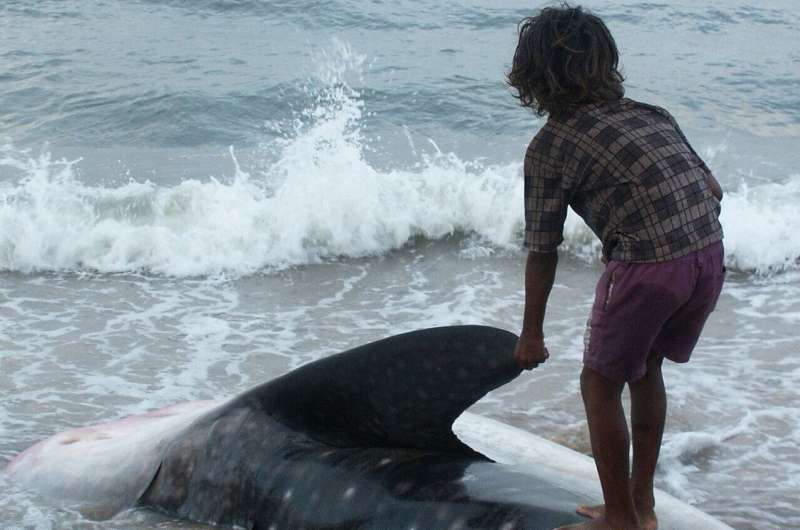This article has been reviewed according to Science X's editorial process and policies. Editors have highlighted the following attributes while ensuring the content's credibility:
fact-checked
peer-reviewed publication
trusted source
proofread
Expert says urgent enforcement is needed in Indonesia to prevent trade in endangered whale sharks

Authorities in Indonesia must act to enforce wildlife protection laws to protect endangered whale sharks, says an Oxford Brookes University professor.
Whale sharks are the world's largest fish and females can grow up to 15 meters long weighing 15 metric tons or more. But despite their large size which helps protect them from predators, they remain at risk from fishing communities in Java, Indonesia's political, economic and industrial center, says Vincent Nijman, Professor in Anthropology at Oxford Brookes University in the UK.
Professor Nijman, who also heads the Oxford Wildlife Trade Research Group, has been visiting the country and gathering data on the subject for more than two decades. His research partly draws on photos and videos posted by the public on social media and online which show whale sharks being caught, butchered and traded. His work has been published in Animals.
Professor Nijman said, "Many countries, including Indonesia, have given the species legal protection and internationally there are several agreements to conserve whale sharks.
"Based on the 58 landings of whale sharks on the coast of Java, it is clear that many of the landed sharks are immature, measuring only six to seven meters in length, but still weighing over two tons.
"It is also clear that more landings occur in August to September, at the end of the dry season. On average, one to two dozen whale sharks are landed each year along Java's coast.
"While some of these landed whale sharks are returned to the sea, either dead or alive, or left on the beach to slowly decompose and play their part in the nutrient cycle, a good number end up in trade."
Professor Nijman said whale sharks differ from many other shark species as they are filter feeders, eating plankton. They are therefore neither dangerous to humans, nor do they compete with fisher people for valuable catch.
He added, "With a friendly demeanor, whale sharks are increasingly recognized as being more valuable alive than dead. In areas where the species regularly congregates, tourists are viewing them from boats or are given the opportunity to swim with these friendly giants.
He added, "When killed they bring in just a few thousand dollars each to a fishing community. This is a bonus to those communities but it is not vital to sustain their livelihoods. There is no reason to profit from whale sharks in this manner, but until there is active enforcement, people will continue catching and selling them."
Dr. Chris Shepherd, executive director of the Monitor Conservation Research Organization in Big Lake, Canada, and not involved in the research, said, "While it may seem wasteful not to use the meat and the oil of a caught whale shark, allowing the trade to continue puts additional pressure on the whale shark population living off the coast of Java and provide incentives for fisher people to continue to target the species despite their legally protected status in Indonesia.
"There is a reason why Indonesia has included the species on their protected species list, and why globally there are numerous agreements in place to preserve the species—allowing the trade in whale shark parts to continue, as is indeed the case along the south coast of Java, undermines these efforts."
More information: Vincent Nijman, Illegal Trade in Protected Sharks: The Case of Artisanal Whale Shark Meat Fisheries in Java, Indonesia, Animals (2023). DOI: 10.3390/ani13162656
Journal information: Animals
Provided by Oxford Brookes University




















